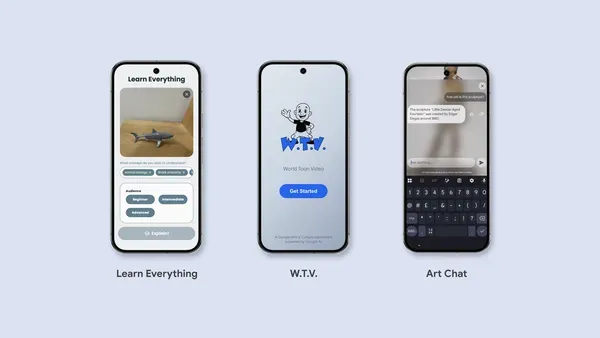Google just launched three AI-powered educational experiments that transform everyday objects into interactive learning experiences. The new tools - Learn Everything, World Toon Video, and Art Chat - use generative AI to create personalized educational content, marking Google's latest push into consumer AI applications beyond search and productivity.
Google is betting that the future of education looks a lot more like playing with AI than sitting in a classroom. The company just unveiled three experimental tools through its Arts & Culture division that turn mundane photos into science lessons and selfies into historical adventures.
The launch represents Google's continued expansion of consumer-facing AI applications, following recent integrations of Gemini across its product suite. While competitors like OpenAI focus on chatbots and Microsoft pushes productivity tools, Google's taking a distinctly playful approach to AI education.
The star of the trio is Learn Everything, created by Google Arts & Culture Lab Artist in Residence Gaël Hugo. The tool uses Google's AI to transform any photo into a teaching moment. Snap a picture of your cat, and suddenly you're learning about thermodynamics through feline metaphors. A burger becomes a gateway to quantum mechanics, while your morning cappuccino explains biochemistry concepts.
"What if your cat could teach you about general relativity?" asks Amit Sood, Senior Director of Google Arts & Culture, in the company's blog post announcing the experiments. The tool adapts its explanations to beginner, intermediate, or advanced levels, making complex scientific concepts accessible through familiar visual anchors.
World Toon Video takes personalization even further. Users upload selfies and choose historical backdrops or cosmic settings, then watch as generative AI creates short educational videos with them as animated protagonists. It's essentially turning everyone into the star of their own documentary, whether they're exploring ancient Rome or traveling through galaxies.
The third experiment, Art Chat, tackles a different challenge - making art museums more interactive. The tool lets users pause educational videos about famous artworks and ask questions in real-time. "Why does the sky swirl in The Starry Night?" or "Why does Hopper's Nighthawks feel so lonely?" Google Gemini provides immediate answers without interrupting the viewing experience.
These experiments arrive as tech giants race to find practical applications for their AI investments beyond enterprise software. has been pushing AI-powered social features, while focuses on device-based AI assistance. Google's approach - using AI to gamify learning - could signal a new front in the consumer AI wars.












